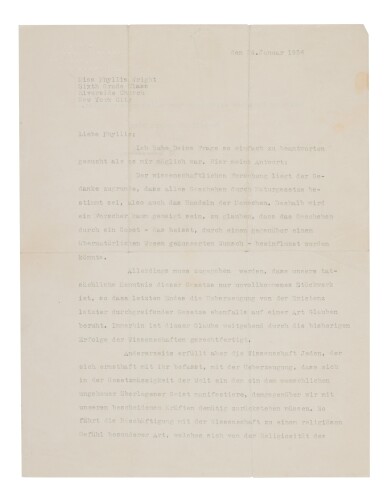Fine Books and Manuscripts
Fine Books and Manuscripts

Einstein, Albert | A remarkable letter to Phyllis Wright on prayer, faith, and the existence of God
Lot Closed
December 8, 08:50 PM GMT
Estimate
50,000 - 70,000 USD
Lot Details
Description
Einstein, Albert
1 1/2 pages (280 x 215 mm). Typed letter in German signed ("A. Einstein"), on personal letterhead with embossed "Mercer Street" address, Princeton, NJ, 24 January 1936, to Phyllis Wright, Riverside Church, New York City; old folds, three short closed tears, tiny pin puncture in top margin. Accompanied by an English translation. Maroon cloth clamshell box.
Einstein on prayer, faith, and the existence of God.
An early, sympathetic statement recognizing a spirit in the universe superior to humans, underlying the natural order.
When Einstein came to the United States in 1933, ultimately deciding to reside in Princeton as a fellow of the Institute for Advanced Study, his scientific and personal fame had already been long established. His reputation as “the world’s smartest man” was such that people sent him letters asking his opinion and advice on all manner of personal, political and scientific questions, many dealing with religion, and some intending to use his answer in support of their cause. He answered many of these letters, gauging his response, as would any intelligent and kindly person, to the age and background of the recipient.
In 1936, Phyllis Wright, a young student at the Riverside Church Sunday School, wrote a letter asking whether scientists pray, and if so, what they pray for (Max Jammer’s paraphrase in Einstein and Religion [1999], p. 92). Indeed, Einstein had been pondering the relation of science to religion at least since 1930 when the issue arose in two interviews. His response to Phyllis is presented with a gentle, encouraging tone, endeavoring to find value and support in faith, but shifting its source from dogmatic belief to a quasi-empirical view based on long study of nature. He begins by implying that the question is more complex than he can treat here: “I shall try to answer your question as simply as possible. This is my answer...”
He remarks that scientists assume that the world works according to natural laws and so are reluctant to believe that these events can be altered by prayer: “Those who study science assume that all events in history, including the actions of man, follow natural laws. For that reason a scientist will scarcely be able to believe that these actions and events can by changed by prayer, which is a wish directed to some being greater than man.”
He continues noting that because scientific knowledge of these laws is partial, our belief in them must rest on a sort of faith, but a faith supported by results: “Of course, it is a fact that what we know of these laws of nature is very partial, so that the conviction that such laws of nature exist really rests, when we have thought as far as we can, upon a kind of faith. However, this faith has been shown to be well founded, to a large degree, by what science has actually been able to do.”
He concludes by conceding that scientists, seeing nature conform to these laws, are convinced that there is a spirit greater than humans before whom our powers are very small, and that scientific study leads to a unique religious feeling: “On the other hand, those who are devoted to scientific study are filled with the conviction that the world in its regularity [“Gesetzmässigkeit”] shows a spirit [“Geist”] vastly greater than man’s and before whom we must humbly confess our own very modest powers. Scientific work, therefore, leads to religious feeling of a unique type which is, of course, different from that of less-informed people [“naiveren Menschen”]".
A wonderfully humane and serious response on a tender subject.
